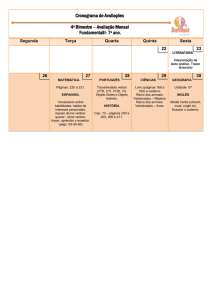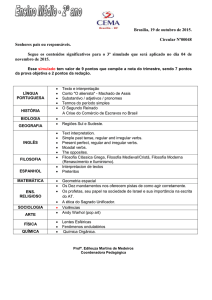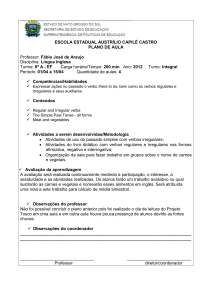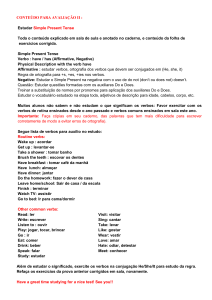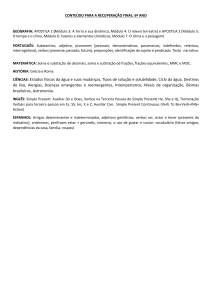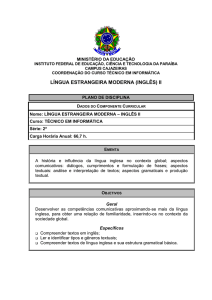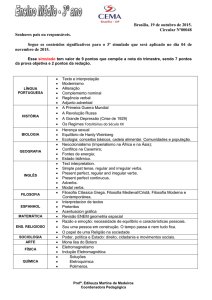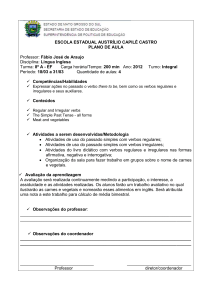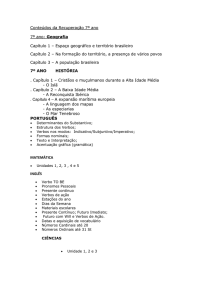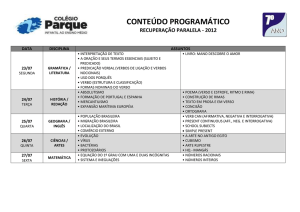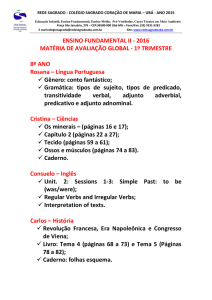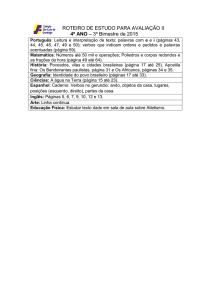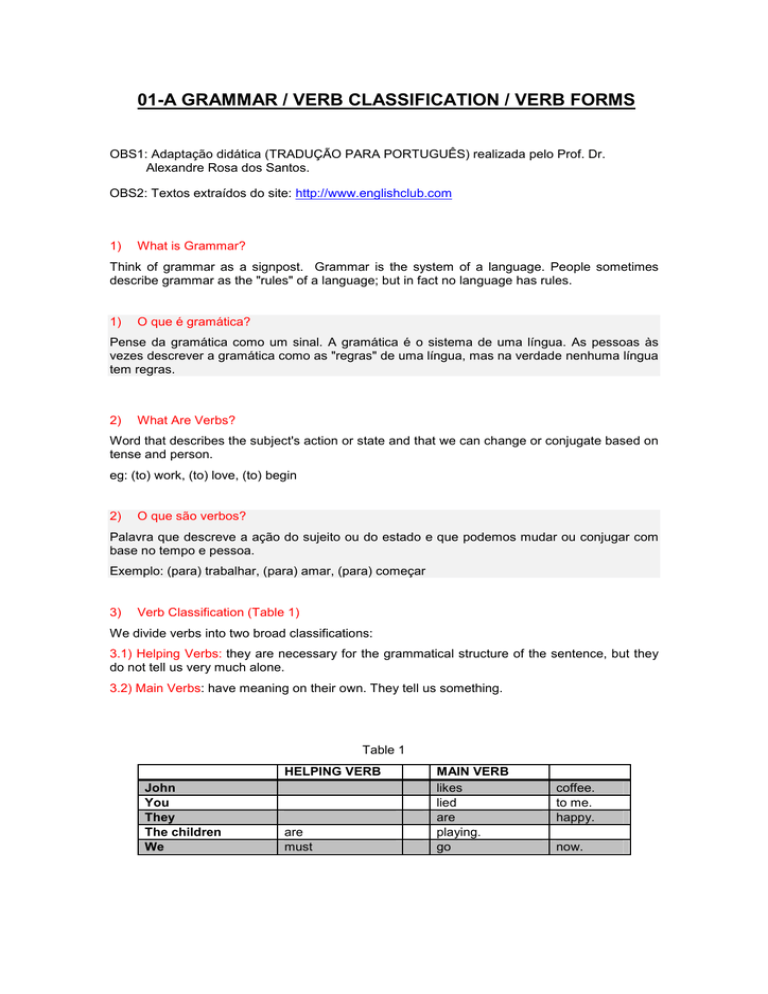
01-A GRAMMAR / VERB CLASSIFICATION / VERB FORMS
OBS1: Adaptação didática (TRADUÇÃO PARA PORTUGUÊS) realizada pelo Prof. Dr.
Alexandre Rosa dos Santos.
OBS2: Textos extraídos do site: http://www.englishclub.com
1)
What is Grammar?
Think of grammar as a signpost. Grammar is the system of a language. People sometimes
describe grammar as the "rules" of a language; but in fact no language has rules.
1)
O que é gramática?
Pense da gramática como um sinal. A gramática é o sistema de uma língua. As pessoas às
vezes descrever a gramática como as "regras" de uma língua, mas na verdade nenhuma língua
tem regras.
2)
What Are Verbs?
Word that describes the subject's action or state and that we can change or conjugate based on
tense and person.
eg: (to) work, (to) love, (to) begin
2)
O que são verbos?
Palavra que descreve a ação do sujeito ou do estado e que podemos mudar ou conjugar com
base no tempo e pessoa.
Exemplo: (para) trabalhar, (para) amar, (para) começar
3)
Verb Classification (Table 1)
We divide verbs into two broad classifications:
3.1) Helping Verbs: they are necessary for the grammatical structure of the sentence, but they
do not tell us very much alone.
3.2) Main Verbs: have meaning on their own. They tell us something.
Table 1
HELPING VERB
John
You
They
The children
We
are
must
MAIN VERB
likes
lied
are
playing.
go
coffee.
to me.
happy.
now.
3)
Classificação Verbo (Tabela 1)
Vamos dividir os verbos em duas categorias amplas:
3.1) Verbos de ajuda: eles são necessários para a estrutura gramatical da sentença, mas eles
não nos dizem muito sozinho.
3.2) Verbos principais: tem significado por conta própria. Eles nos dizem alguma coisa.
Tabela 1
VERBOS DE AJUDA
John
Você
Eles
As crianças
Nós
4)
estão
temos
VERBOS PRINCIPAIS
gosta
mentiu
estão
Brincando.
ir
que
de café.
para min.
felizes.
agora
Verb Forms
With the exception of the verb to be (9 forms), English main verbs have only 4, 5 or 6 forms.
4.1) Forms of Main Verbs: see example in Table 2.
Table 2
V1
REGULAR
IRREGULAR
4)
INFINITIVE
BASE
(to) work
(to) sing
(to) make
(to) cut
(to) do
(to) have
(to) be
work
sing
make
cut
do
have
be
V2
PAST
SIMPLE
worked
sang
made
cut
did
had
was, were
V3
PAST
PARTICIPLE
PRESENT
PARTICIPLE
worked
sung
made
cut
done
had
been
working
singing
making
cutting
doing
having
being
PRESENT
SIMPLE,
3RD
PERSON
SINGULAR
works
sings
makes
cuts
does
has
am, are, is
FORMS
Formas verbais
Com exceção do verbo ser (9 formas), os verbos principais do Inglês têm apenas 4, 5 ou 6
formas.
4.1) Formas de verbos principais: veja o exemplo da Tabela 2.
5
6
5
4
6
5
9
Tabela 2
REGULAR
IRREGULAR
V1
V2
V3
INFINITIVO
BASE
PASSADO
SIMPLES
PARTICÍPIO
PASSADO
PARTICÍPIO
PRESENTE
(para) trabalhar
(para) cantar
(para) fazer/criar
(para) cortar
(para) fazer
(para) ter
(para) ser
trabalhar
cantar
fazer
cortar
fazer
ter
ser
trabalhou
cantou
fez
cortou
fez
teve
foi
trabalhado
cantado
feito
cortado
feito
teve
sido
trabalhando
cantando
fazendo
cortando
fazendo
tendo
sendo
PRESENTE
SIMPLES, 3°
PESSOA DO
SINGULAR
trabalha
canta
faz
corta
faz
têm
é
4.2) Forms of Helping Verbs: there are 2 groups of helping verbs.
A) Primary helping verbs: used mainly to change the tense or voice of the main verb, and in
making questions and negatives (“be”, “have” and “do”):
Scheme
be + -ing (present participle)
have + V3 (past participle)
do + V1 (base verb)
Examples:
be
1 - to make continuous tenses (He is watching TV.)
2 - to make the passive (Small fish are eaten by big fish.)
have
1 - to make perfect tenses (I have finished my homework.)
do
1 - to make negatives (I do not like you.)
2 - to ask questions (Do you want some coffee?)
3 - to show emphasis (I do want you to pass your exam.)
4 - to stand for a main verb in some constructions (He speaks faster than she does.)
4.2) Formas dos Verbos de ajuda: existem 2 grupos de verbos de ajuda:
A) Verbos de ajuda primários: usados principalmente para mudar o tempo ou a voz do verbo
principal, e em fazer perguntas e negativas (“ser”, “ter” e “fazer”):
Esquema
ser +-ing (particípio presente)
tem + V3 (particípio passado)
fazer + V1 (base do verbo)
Exemplos:
ser
1 - para tornar tempos contínuos (ele está assistindo TV.)
2 - para tornar passivo (peixes pequenos são comidos por peixes grandes.)
Ter
1 - para tornar tempos perfeitos (eu tenho que terminar minha lição de casa.)
Fazer
1 - para fazer negativass (eu não gosto de você.)
2 - para fazer perguntas (Você quer um café?)
3 - para mostrar ênfase (eu quero que você passe no seu exame.)
4 - para representar um verbo principal em algumas construções (Ele fala mais rápido do que
ela.)
B) Modal helping verbs: used to change the "mood" of the main verb. These are the modal
verbs:
- can, could
- may, might
- will, would,
- shall, should
- must
- ought to
Examples:
1 - I can't speak Chinese.
2 - John may arrive late.
3 - Would you like a cup of coffee?
4 - You should see a doctor.
5 - I really must go now.
B) Verbos de ajuda modais : utilizados para alterar a "disposição/humor" do verbo principal.
Estes são os verbos modais:
Poder, poderia
Poder, poderá
Ser, seria
Deve, deverá
Dever
Dever
Exemplos:
1 - Eu não posso falar chinês.
2 - João pode chegar tarde.
3 - Você gostaria de uma xícara de café?
4 - Você deverá ir ao médico.
5 - Eu realmente devo ir agora.

